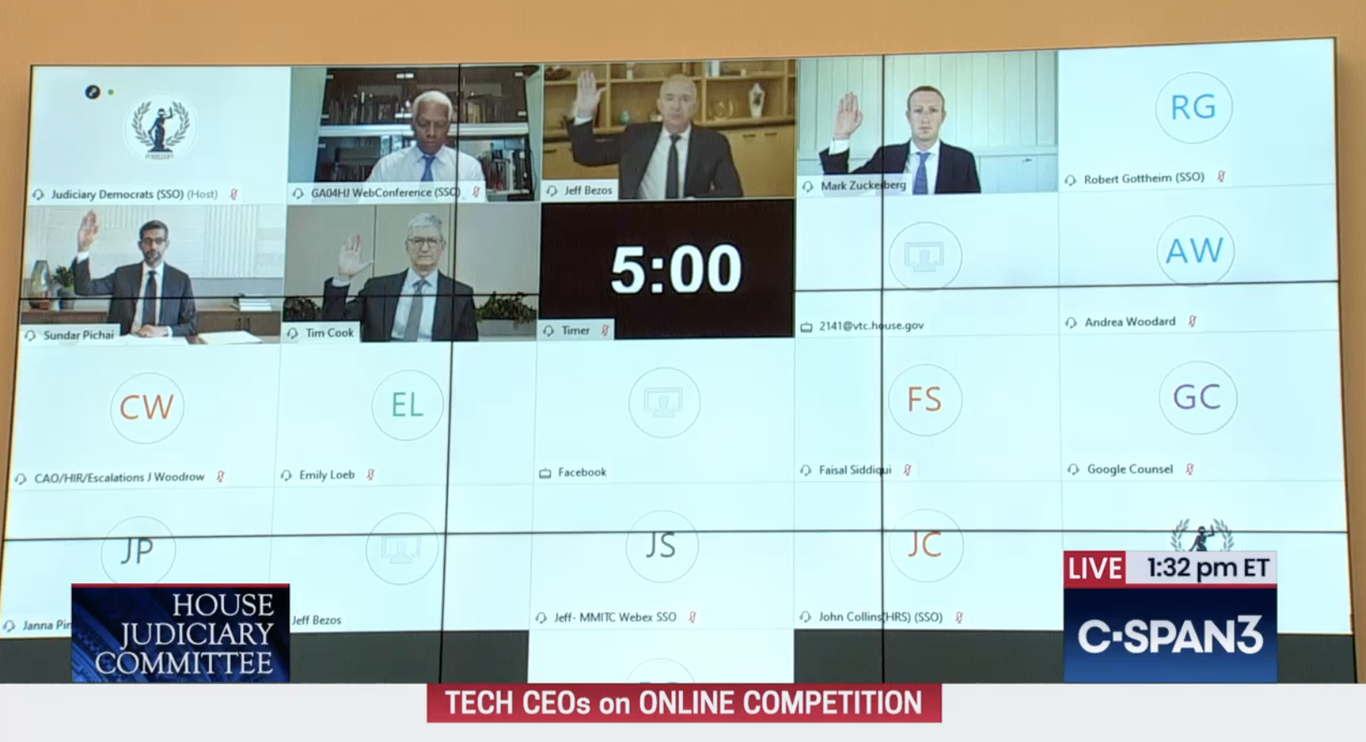Wednesday’s House antitrust hearing with the CEOs of Facebook, Google, Amazon and Apple went down some politically fraught rabbit holes, but also saw tech’s most powerful figures face sharper questions than they’ve seen before from Washington.
What’s happening: Republicans slammed the companies for alleged anti-conservative bias, but Democrats largely narrowed their focus to possible competitive abuses, putting the CEOs on their back feet and producing some surprising admissions.
Why it matters: The face-off is the culmination of a protracted conflict between Washington and Silicon Valley that has seen members of both parties push antitrust enforcement as a cure for any number of Big Tech ills.
What they’re saying: Rep. David Cicilline, the House Judiciary antitrust subcommittee chair overseeing the hearing, sought to bring prosecutorial zeal to the proceedings, starting with questions posed to Google CEO Sundar Pichai.
- Cicilline accused Pichai’s company of stealing content from smaller companies to build out its search results and push users away from rival platforms and onto Google properties.
- He singled out Google allegedly building search results on material from CelebrityNetWorth.com, denying the site actual revenue-creating clicks.
- The company has “used its surveillance over web traffic to identify competitive threats and crush them,” Cicilline maintained.
- Pichai said in response, “We try to understand trends from data we can see and we use it to improve products from users.”
Facebook CEO Mark Zuckerberg faced a grilling from Rep. Jerry Nadler, chairman of the full Judiciary Committee, who sought to pin him down on the company’s 2012 acquisition of Instagram.
- Nadler said previously unseen emails reveal that Zuckerberg “saw Instagram as a threat that could potentially siphon business away from Facebook.”
- Zuckerberg said he only viewed it as a competitor with respect to sharing photos online, but not as an existential threat to be neutralized through acquisition. “With hindsight, it looks obvious that Instagram would have reached the scale it did today,” he said. “At the time, it was far from obvious.”
Some of the sharpest questioning of the day was reserved for Zuckerberg.
- Rep. Joe Neguse pressed him on Facebook’s acquisition strategy, and said Facebook was already a monopoly by 2012. The lawmaker brought up an email from Zuckerberg in which he wrote, “you can likely buy any competitive startups, but it’ll be a while before we can buy Google.” Zuckerberg said he had been joking.
- “Facebook, Facebook Messenger, WhatsApp and Instagram are the most downloaded apps of the last decade. Facebook owns them all,” Neguse said. “We have a word for that: monopoly,” said Neguse.
- Rep. Pramila Jayapal asked Zuckerberg about Facebook’s pattern of copying competitors. “We’ve certainly adopted features that others have led in,” said Zuckerberg.
Amazon CEO Jeff Bezos acknowledged that, despite past denials and company policy against it, he can’t rule out the possibility that employees have tapped third-party sales data to develop in-house products.
- Jayapal, whose Seattle district is in Amazon’s backyard, noted press reports that seem to contradict past testimony from Amazon associate general counsel Nate Sutton, who told her the company “does not use specific seller data” when creating its own private label products.
- “I can’t guarantee you that policy has never been violated,” Bezos said. “I’m not yet satisfied we’ve gotten to the bottom of that.”
- Rep. Lucy McBath, meanwhile, played a tape of a small business owner saying Amazon’s marketplace practices were hurting her employees’ livelihoods. Bezos said mistreatment of sellers was not “systematic” and maintained third-party sellers overall do very well overall on Amazon.
- Neguse asked Bezos if Amazon uses data from Amazon Web Services to build business strategy on competitors. Bezos said no, but later conceded Amazon may learn things from the data after Neguse brought up evidence indicating it has happened.
Panel Democrats turned some of the revelations like the Instagram emails into an interactive experience for Congress and tech watchers following along at home, sharing them on the House Judiciary Twitter feed.
- In one 2012 email, Zuckerberg warned that companies like Instagram and now-defunct social network Path “if they grow to a large scale could be very disruptive to us.”
- A 2015 internal Apple email, meanwhile, appeared to show the company putting Chinese tech giant Baidu on a fast track for app review, even though the company says it treats all app developers equally. CEO Tim Cook insisted as much under questioning Wednesday.
Context: Democratic panel leaders upbraided the companies from the start.
- “Simply put, they have too much power,” Cicilline said in opening remarks. “This power staves off new forms of competition, creativity, and innovation.”
- All four companies operate platforms that serve as “bottlenecks” for those looking to get apps, content and goods out to people and use their power to surveil rivals and force consumers into their ecosystems, Cicilline maintained.
But Republicans sought to pivot. Ranking antitrust panel member Jim Sensenbrenner celebrated tech companies for their size and power, narrowing his criticism to the bias allegations.
- Rep. Jim Jordan, top Republican on the full Judiciary panel, greatly ramped up that line of attack, stating flatly, “Big tech is out to get conservatives.”
- He and Reps. Greg Steube and Matt Gaetz repeatedly went after the companies for what they said were actions meant to stifle conservative speech.
For their part, the CEOs used their opening remarks to describe humble beginnings for their companies and argue that U.S. policies allowed them to flourish.
Go deeper:
- Congress vs. tech’s gang of four
- D.C.’s assault on tech will crest at CEO hearing
- The one big thing each tech CEO will tell Congress
- Big Tech’s power in four numbers
- For tech’s big four, big contrasts
- Tech CEOs’ task: Stay cool, wave flag
This is a developing story. Keep checking back for updates.
